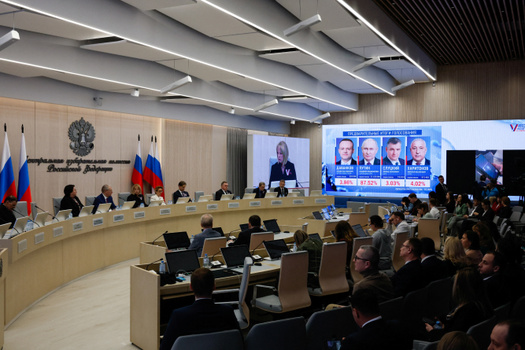
With Russia’s three-day voting done, Putin secures his fifth presidential term and 25th–31st years in power
Мы говорим как есть не только про политику. Скачайте приложение.
With more than 98 percent of precincts reporting, Vladimir Putin has claimed a fifth presidential term, collecting more than 87 percent of the ballots with official turnout above 74 percent. Putin’s closest rival, Nikolai Kharitonov of the Communist Party, failed to crack even five percent. The voting itself presented no surprises. Putin has held power in Russia for nearly a quarter century, and his next term in office runs to 2030 when he’s free to run for reelection yet again, thanks to constitutional amendments adopted in 2021. Meduza breaks down the weekend’s protests, ballot-box sabotage, and violence.
’Noon Against Putin’
With Sunday’s voting outcome a forgone conclusion, the only unknowns were what, if any, protest activity might occur. Former St. Petersburg municipal deputy Maxim Reznik devised a scheme that became known as “Noon Against Putin,” calling on the president’s opponents to synchronize their voting at 12 p.m. on Sunday, March 17. The plan’s premise was that Russia now prohibits all opposition demonstrations, but voting allows a public assembly without violating the authorities’ lockdown. “Noon Against Putin” won Alexey Navalny’s endorsement and the support of prominent opposition members in exile, including Mikhail Khodorkovsky, Dmitry Gudkov, Yulia Galyamina, and others.
“Noon Against Putin” crowds were spotted across Russia, beginning in the Far East and moving westward as voting continued. Meduza tracked midday lines outside voting precincts in Novosibirsk, Chelyabinsk, Perm, Yekaterinburg, Tomsk, Moscow, St. Petersburg, and other cities.
At embassies abroad, where Russians could assemble openly with anti-Putin, anti-war political banners, voters lined up at noon in Vilnius, Riga, Yerevan, Tbilisi, Belgrade, Podgorica, Paris, Brussels, Barcelona, London, Lisbon, Bishkek, Astana, Tel Aviv, The Hague, and other cities. One of the largest crowds assembled in Berlin, where Alexey Navalny’s widow, Yulia Navalanaya, voted after waiting in line for roughly six hours. An eyewitness told Meduza that he overheard Russian embassy staff discussing Navalnaya’s presence and debating whether they could prevent her from entering the building to vote. (The officials decided that they couldn’t stop her.)
Voter intimidation
A day before Sunday’s noon campaign, numerous readers told Meduza and Agentstvo Media that they’d started receiving threatening messages on Telegram and Signal from automated bot accounts. The messages accused the individuals of supporting “extremist ideas” and demanded that they vote “without long lines.”
Journalist Andrey Zakharov examined several dozen of these reports and concluded that the messages targeted people who shared two conditions: (1) they were registered to vote in Moscow or had been removed from their local precinct’s voter list, and (2) they had publicly traceable ties to Alexey Navalny or his Anti-Corruption Foundation. Zakharov found that “sympathies” with Navalny included attending his burial in Moscow, suggesting that surveillance cameras or other footage were used to identify them.
Before voting began, state prosecutors in Moscow responded to Internet chatter about “Noon Against Putin” by issuing a warning that any “unpermitted demonstrations” with the aim of “violating election laws” and preventing “the free exercise of voting rights” were punishable by up to five years in prison. By the end of voting, monitors at OVD-Info counted more than 86 arrests in 21 different cities across Russia.
In lieu of waving banners and shouting in crowds, many opposition voters resorted to “spoiling” their ballots. People scrawled anti-Putin, anti-war slogans on the paper, wrote the names of Alexey Navalny and Yulia Navalnaya, wrote Navalny’s dying wish, “Don’t give up,” and so on. Other messages on ballots read, “Love is stronger than death,” “Putin is a usurper, thief, and murderer,” and at least one person drew a steaming pile of feces over Putin’s name. Meduza collected photos of these ballots here.
Scammer sabotage
By Saturday morning, police had opened more than a dozen felony cases in response to individuals who sprayed dye, ink, or paint into ballot boxes. Some people even started fires, and one woman reportedly lost her arm while setting off a firecracker. According to media reports, the suspects arrested in these incidents say they were coerced into these acts by telephone scammers who fooled them out of their personal savings and then offered to return the money in exchange for sabotaging the local voting precinct. Attempts to damage ballot boxes were reported in Moscow, Simferopol, Volgograd, Novosibirsk, Rostov, and Karachay-Cherkessia.
There hasn’t been a uniform police response to these incidents. For example, in Yekaterinburg, a chemical scientist who teaches at Ural Federal University was arrested after spraying green dye into a ballot box. She says scammers told her this was the price for returning her life savings of 15 million rubles ($162,100). Officials let her off with charges of disorderly conduct. On the other hand, a 20-year-old woman in Moscow is now in pretrial detention awaiting felony charges after spraying the same substance into a ballot box at her precinct.
Battlefront voting
Throughout Russia’s three-day presidential voting, the Belgorod region remained under regular drone attack and rocket fire. Ukrainian attacks disrupted voting on several occasions and killed at least two civilians, including a 16-year-old girl, according to Governor Vyacheslav Gladkov.
In territories that Russia invaded and annexed after February 2022, early voting kicked off ahead of March 15. Officials allowed residents to cast ballots using whatever identification they presented, including Ukrainian passports. Voting was conducted in the presence of soldiers. In Luhansk, Donetsk, Zaporizhzhia, and Kherson, official turnout ranged from 83 to more than 88 percent.